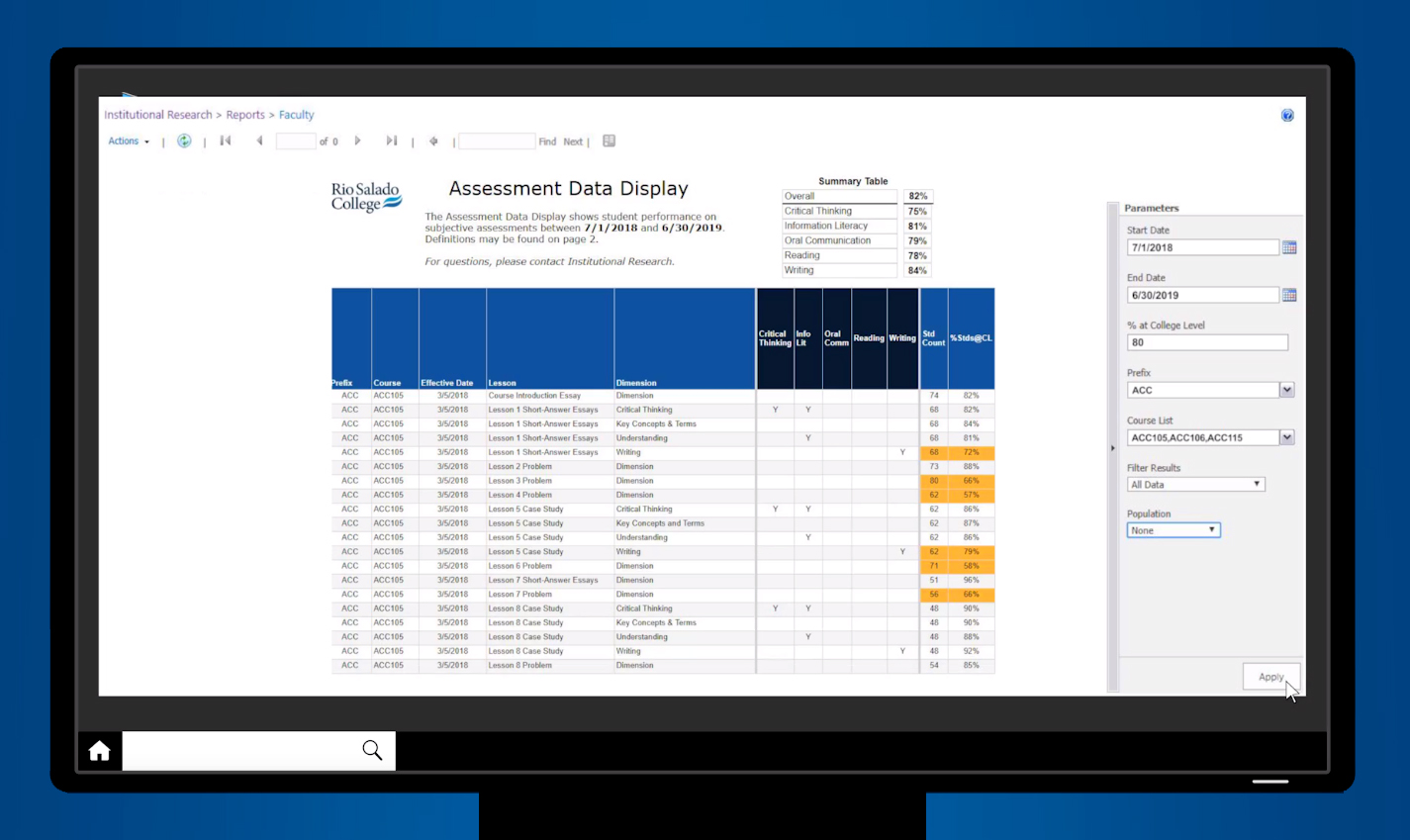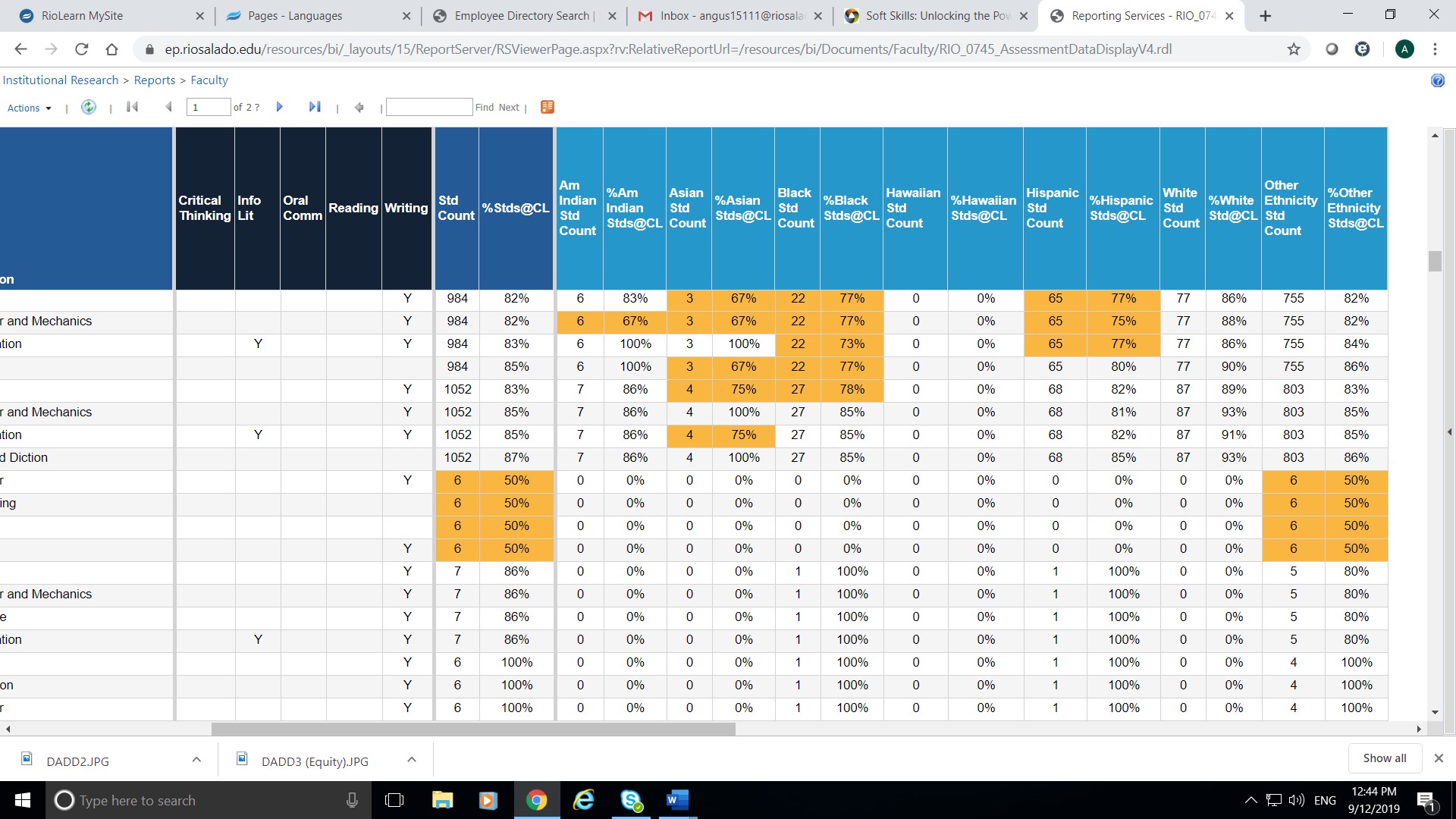Each year I am so happy to coordinate the WCET Awards initiative, through which our cooperative honors institutions and individuals for exciting work in technology-enhanced learning. One of my favorite aspects of this initiative is working with our WOW Awards. The WCET Outstanding Work (WOW) Awards honor member institutions and organizations that develop technology-based solutions to challenging educational needs. 
This year we had many exceptional nominees for the WOW Awards. The award committee selected three winners out of a competitive pool of nominees: the Colorado Department of Higher Education’s OER Council, Granite State College, and Rio Salado College. Over the next several weeks, each of these institutions will be featured here on WCET Frontiers.
Today we are excited to hear from Rio Salado College about the Dynamic Assessment Data Dashboard – or DADD. Enjoy reading about this great program to help assess important, soft and career related skills.
Lindsey Downs, WCET
Measuring “Soft” Skills
Even under the best of circumstances, with plenty of human and financial resources, measuring student achievement of “soft” skills is hard work. Yet, the ability to solve problems and communicate clearly are the types of skills that employers say they are looking for in potential hires.  According to a June 2019 WCET Frontiers post on soft skills, only 7% of employers surveyed said they’d hire a candidate who possessed the technical skills required but lacked critical thinking skills, while 52% of employers said they’d hire a candidate who possessed critical thinking skills but lacked the required technical skills.
According to a June 2019 WCET Frontiers post on soft skills, only 7% of employers surveyed said they’d hire a candidate who possessed the technical skills required but lacked critical thinking skills, while 52% of employers said they’d hire a candidate who possessed critical thinking skills but lacked the required technical skills.
Efforts to assess and document student performance in soft-skill areas are typically isolated to general education courses that explicitly teach those skills, such as First Year Composition, College Critical Reading, Public Speaking, etc. Though it is important to include snapshot data from such courses when reporting on student performance on institution-wide outcomes, this approach is not sufficient to capture the learning that occurs over time across all courses and programs, and it does not reveal curricular weaknesses that may need to be addressed in courses that are not part of the general education core.
In addition to assessing learning outcome performance at the institution level, we need to be able to drill down to the individual student level to ensure equity among populations.  Without the ability to identify trends and gaps, curricular changes informed by macro-level data have the potential to result in negative unintended consequences for particularly vulnerable student populations. And if the ability to think critically and communicate effectively truly are “employability” skills, then it is our responsibility to ensure that each and every one of our students has an equal chance to achieve those skills. In order to more effectively assess soft skills, identify trends and gaps, and impact curricular changes across the college, Rio Salado created the Dynamic Assessment Data Dashboard, or DADD.
Without the ability to identify trends and gaps, curricular changes informed by macro-level data have the potential to result in negative unintended consequences for particularly vulnerable student populations. And if the ability to think critically and communicate effectively truly are “employability” skills, then it is our responsibility to ensure that each and every one of our students has an equal chance to achieve those skills. In order to more effectively assess soft skills, identify trends and gaps, and impact curricular changes across the college, Rio Salado created the Dynamic Assessment Data Dashboard, or DADD.
Approaching Equity in Assessment – the DADD
At Rio Salado College, we have taken a unique approach to the hard work of soft-skill assessment and improvement.  Using descriptive data available in our assessment database, faculty subject-matter experts in the areas of Critical Thinking, Writing, Reading, Information Literacy, and Oral Communication “tag” assignments across the curriculum that align with one or more of these skills.
Using descriptive data available in our assessment database, faculty subject-matter experts in the areas of Critical Thinking, Writing, Reading, Information Literacy, and Oral Communication “tag” assignments across the curriculum that align with one or more of these skills.
Our Dynamic Assessment Data Dashboard (DADD) displays the results of this backend work so all faculty, including those teaching in other areas, can see how their students are performing.
As illustrated below, assignments in which student performance fell below the target are highlighted so that faculty can focus their efforts on modifying their instructional practices to improve overall student performance:

The results can then be sorted by student groupings such as Pell-eligible, ethnicity, or those who were placed into developmental English, math, and/or reading courses, to reveal potential curricular gaps to be addressed in any of the courses we offer.

The DADD puts critical data directly into the hands of the faculty. Instead of relying on guesswork or anecdotal feedback from a handful of students, faculty can use performance data from all students to make informed decisions on instructional interventions.
On-demand access to data that can be filtered by date range means that faculty can quickly check the effectiveness of interventions, thus shortening the time to complete an improvement cycle.

Ultimately, the goal is to achieve equitable learning outcomes across all student groups, including vulnerable populations, so that students leave our college with the not-so-soft skills they need to be successful in the workplace.
We owe it to our students to approach educational equity with the “sense of urgency” that Stacey VanderHeiden Güney described in her recent Frontiers post. Though this is just part of Rio’s story, our hope is that this approach will inform other colleges and universities that have embraced this important work.
Rio Salado College is honored to have been recognized with a WCET WOW award for this initiative, and we look forward to hearing from other institutions that are trying out new ideas in this space.

Kate Smith, Interim President,
Rio Salado College
kate.smith@riosalado.edu

Angela Felix, Faculty Chair for Languages
Rio Salado College
angela.felix@riosalado.edu


 According to a June 2019
According to a June 2019  Without the ability to identify trends and gaps, curricular changes informed by macro-level data have the potential to result in negative unintended consequences for particularly vulnerable student populations. And if the ability to think critically and communicate effectively truly are “employability” skills, then it is our responsibility to ensure that each and every one of our students has an equal chance to achieve those skills. In order to more effectively assess soft skills, identify trends and gaps, and impact curricular changes across the college, Rio Salado created the Dynamic Assessment Data Dashboard, or DADD.
Without the ability to identify trends and gaps, curricular changes informed by macro-level data have the potential to result in negative unintended consequences for particularly vulnerable student populations. And if the ability to think critically and communicate effectively truly are “employability” skills, then it is our responsibility to ensure that each and every one of our students has an equal chance to achieve those skills. In order to more effectively assess soft skills, identify trends and gaps, and impact curricular changes across the college, Rio Salado created the Dynamic Assessment Data Dashboard, or DADD. Using descriptive data available in our assessment database, faculty subject-matter experts in the areas of Critical Thinking, Writing, Reading, Information Literacy, and Oral Communication “tag” assignments across the curriculum that align with one or more of these skills.
Using descriptive data available in our assessment database, faculty subject-matter experts in the areas of Critical Thinking, Writing, Reading, Information Literacy, and Oral Communication “tag” assignments across the curriculum that align with one or more of these skills.




